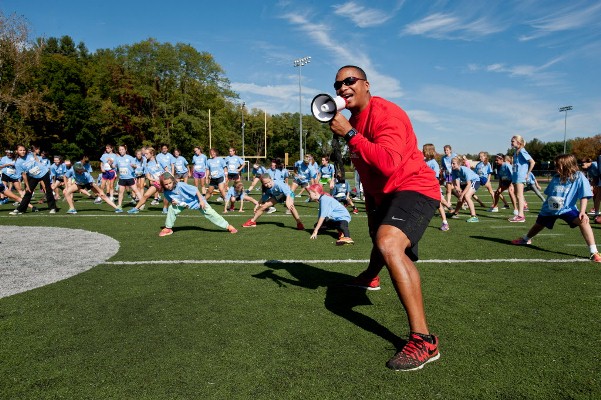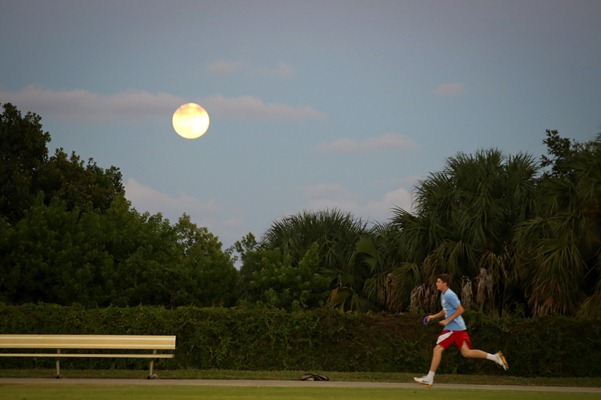Drew, 11, pins a number on his t-shirt and stands beneath the palm trees bordering the track, waiting for his turn. His teammate crosses the line and hands him the baton, and then Drew is off and running as fast as he can.
Drew is one of more than 50,000 kids globally - 12,000 in the United States alone - who are hitting the ground running this month for Save the Children's World Marathon Challenge (#WMC2013). The World Marathon Challenge is a relay race where kids team up and attempt to run a full marathon distance and to beat the world marathon record of 2 hours, 3 minutes and 23 seconds.
 Former NFL running back Vince Workman warming up members of the Wilton High School sports teams for the World Marathon Challenge in Wilton, Conn. on Oct. 14. Photo by Susan Warner for Save the Children.
Former NFL running back Vince Workman warming up members of the Wilton High School sports teams for the World Marathon Challenge in Wilton, Conn. on Oct. 14. Photo by Susan Warner for Save the Children.
It is a fun event, and kids can get extremely competitive in trying to beat the world record. But they are also running for a more important reason: to raise awareness for the millions of children whose lives are on the line and funds to help those who save them. Every five seconds, a child dies from preventable causes like dehydration from a bout of diarrhea because proper medicines and trained health workers are not universally available. In the time it will take for children to run a record-breaking marathon, 1,481 children will die needlessly.
If there is a silver lining in all of this, it is that just a generation ago, these figures would have been twice as bad. Through U.S. government leadership and global commitment, the number of deaths to children under five declined to 6.6 million in 2012, from 12.6 million in 1990. When I think of the faces behind these numbers, I look at the kids taking on the challenge this month. They and millions more are alive today because of the historic progress made in reducing child mortality in places like Ethiopia, India and Mozambique.
While this is good news, we need to do better. We continue to lose children to pneumonia, diarrhea and malaria and we know how to prevent those deaths. And then, we need to do more in three areas where we have not yet made sufficient headway: reaching the poorest children with life-saving measures, ensuring all newborns get proper care; and providing children with good nutrition so they stay healthy and strong enough to fight off life-threatening illnesses. With adequate public support and appropriate levels of government investment in these areas, we can dramatically cut child mortality and give hope to families that their babies will have more than a slim chance of reaching age five.
That is why Save the Children is holding a global day of action this Wednesday, Oct. 23, where kids in 67 countries will run and raise their voices to highlight the need to give every child the very best chance to live a bright future, and will urge their elected officials to take action. Hundreds of teams around the globe, including schools from Connecticut to California, will race in solidarity on that day.
 A member of the Boca Raton Little League runs a relay lap at a race in Boca Raton, Fla. on Oct. 18. Photo by Angel Valentin.
A member of the Boca Raton Little League runs a relay lap at a race in Boca Raton, Fla. on Oct. 18. Photo by Angel Valentin.
In addition, here in the United States, Save the Children will share with members of Congress personal messages from kids taking part in the race. T-shirts will be signed with a message that reminds our legislators that their youngest constituents "run for children - do they?" Save the Children will urge Congress to unite in a common cause that enjoys bipartisan support and renew their efforts to reduce preventable child deaths globally.
Most American children who are running entered kindergarten at age five with little idea what a huge victory reaching age five truly is. I imagine some will celebrate breaking the world record, but I am thinking about the birthday parties for those 5-year-olds around the world who, without continued effort, would never have completed the race.
